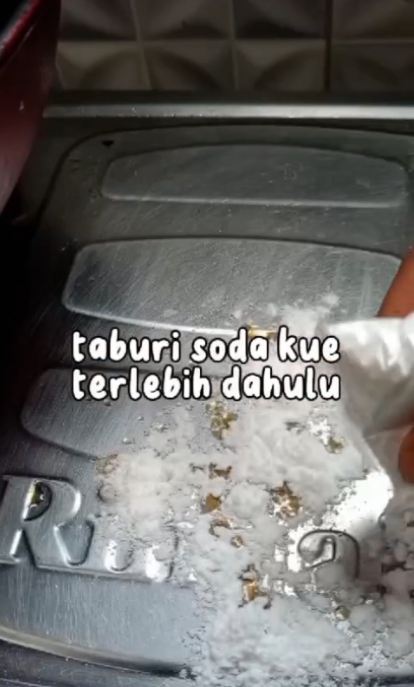Instagram/@safaralles
Brilio.net - The stove is a very important piece of kitchen furniture to support the cooking process. This type of fireplace has been widely used because it is considered more practical and makes food cook quickly. Apart from that, stoves also tend to be safer because the fire they emit can be controlled in such a way.
If you often use your stove for cooking, maintaining it well is important to extend its service life. Apart from that, the stove must also be kept clean so that it is more comfortable to use and lasts longer. Although it cannot be denied that the cooking process always makes the stove instantly dirty.
Indeed, when used, various kinds of stains from cooking can spill onto the surface of the stove. This includes oil stains from the process of frying food. Well, spilled oil stains can make the stove dirty and slippery, you know.
Unfortunately, cleaning up oil spills is not easy. If you wipe it directly with a cloth, it is very likely that there will be remaining stains that stick and make the stove remain slippery. For this reason, some people usually sprinkle wheat flour on the affected area. Flour is considered to be able to absorb oil stains and make the stove cleaner.
However, apart from using flour, there are other kitchen ingredients that are no less effective in cleaning oil spills on the stove. This kitchen ingredient was once used by the netizen who owns the Instagram account @safaralles. Through one of the uploaded videos, he admitted that these kitchen ingredients can make the stove rough and not smelly, you know.

photo: Instagram/@safaralles
Reported by BrilioFood from the Instagram account @safaralles on Wednesday (8/5), the kitchen ingredient in question is baking soda. Baking soda, or sodium bicarbonate, is an effective ingredient in removing oil stains on the stove for several reasons.
First, the mild abrasive properties of baking soda can help scrape off layers of stain without damaging the surface of the stove. Second, baking soda is alkaline, so it can help dissolve stains that come from oil and fat. Third, baking soda also has good absorbent properties, so it can absorb oil that sticks to the surface of the stove. With the combination of these properties, baking soda is an effective and safe choice for cleaning up oil spills on the stove.

photo: Instagram/@safaralles
So, how to use it, just sprinkle baking soda evenly over all the oil spills on the stove. Then let it sit for a while until the oil stain is absorbed. After that, take baking soda mixed with oil. You can use a cloth to wipe it.

photo: Instagram/@safaralles
When the baking soda is removed, the oil spill will also be removed. That way, the surface of the stove will be clean and smooth again. Apart from that, stoves that are cleaned with baking soda also tend not to smell, you know.
This post about tricks for cleaning up oil spills on the stove has been viewed more than 2,000 times. It's not surprising that many other Instagram users are interested. Some of them even admitted that this trick was very useful to imitate.
View this post on Instagram
Saving cooking oil can help reduce costs and is also more environmentally friendly. Here are some tips for saving cooking oil:
1. Use the right oil.
Select oil suitable for use in repeated frying. Coconut oil, palm oil, or sunflower oil are some examples.
2. Maintain proper temperature.
Heat the oil to the right temperature before adding food. The right temperature will help food fry quickly and prevent excessive oil absorption.
3. Don't add too much food.
Put the food into the oil slowly and don't put too much food at once, because this can make the oil dirty quickly.
4. Filter the oil periodically.
Strain the oil after use to remove food particles that can cause the oil to spoil quickly. Use a paper filter or a special cooking oil filter.
5. Avoid frying for too long.
Don't leave food in hot oil for too long, as this can cause the food to absorb too much oil.
6. Use an oil filter.
Use a cooking oil filter to filter used oil. This will help remove unwanted odors and tastes from the oil.
7. Store oil properly.
Store cooking oil in an airtight container and away from direct heat and light so it doesn't go rancid quickly.
8. Use used oil.
Used oil can be reused for frying several types of food. Make sure to filter and store it properly.
9. Choose foods that don't absorb a lot of oil.
Choose foods that do not absorb a lot of oil when fried, such as foods that have been dried first or foods whose texture is not too porous.
(brl/lut)